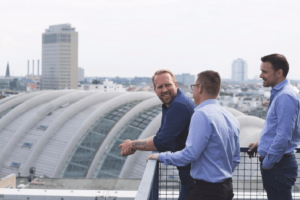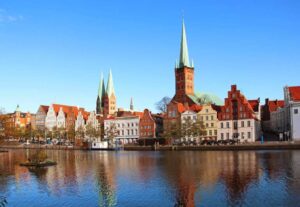
At Zeile7 , we consult all kinds of companies and add value in very diverse fields. We coach and mentor executives, help to define strategy, plan and tactics. And we help put the plan into action.
No matter what we do, how we create value for our customers, we are always involved in cultural matters. And in the end each gig – from high level support to hands-on coding – involves an aspect of cultural change that we actively manage (and therefore leaving our clients more capable of flying unattended).
I started to realise that the way we are working, co-located in big offices, big offices located in big cities, suffering from big office-culture, does not have a future back in 2014 when I worked for Axel Springer (leading BILD and WELT Paywalls, later creating UPDAY ).
I understood that the centralization of exciting jobs resulted in a lose-lose situation for employers and employees. The war on talent boosted the cost of tech talent to ever-rising heights (making it a hard-to-afford luxury) while at the same time people were forced to live big city life if they wanted to work on something meaningful.
Both poorly implemented and barely understood ‘agile’ practices manifested in unhealthy ways, along other problems imposin being co-located.
At the same time the way we worked made people sick and produced very little outcome. Everyone was working harder than they should, more hours than they should have, suffering from high stress. While the outcome for companies was very poor.
I often had moments of clarity in which I realized we needed to get away from this, grow out from what we were doing.
Unfortunately at that time I could not really find new ways.

When I gave birth to ELEMENT (with Wolff Graulich , Eckhardt Weber , Inna Leontenkova and Tim Kaltofen ) we implemented a different culture. Not a culture of Crunchtime, Facetime and Meetings but a culture of focus and productivity. Trust and commitment.
Back then we did not even have our own office and were sharing an office with six other ventures while competing on talent with the big shots.
Only trying to attract more talent in Berlin or opening another office in one of the other startup hubs, we did something a lot of people had doubts on: we did an analysis on smaller german cities.
 Geographic location, quality of living, distance to the next big city, quality of universities – these were some of the criteria. Plus: would we be the coolest kid in town?
Geographic location, quality of living, distance to the next big city, quality of universities – these were some of the criteria. Plus: would we be the coolest kid in town?
We chose Lübeck and were proven right.
Our principal engineer Timo Ulich already had plans to leave Berlin and moved there within a month.
A full team of great engineers left good jobs at Dräger to join us, another great find left MyTaxi and was happy to not commute for 3h/day any more. A Product Owner could move back from Hamburg which she desired to do for long already.
It only took a few months until we outgrew the office with talent so good, we would not have stood a chance to hire in Berlin.
Plus the team being grateful for the opportunity that they were not given before, resulting in extra commitment and motivation.
One wouldn’t be able to go easily from 0 to 100. It wasn’t a completely consequent move either – nearly all companies I have helped ramping up or reorganising, are going remote-first since then, giving them a great competitive advantage. Not only due to, but especially after COVID came across.
We did something different, influencing the culture at ELEMENT in a way that was win-win. People could live the lives they chose while creating way more value and outcome for ELEMENT .
ELEMENT was created by finleap , a company builder (then), an environment with a lot of very smart people from different backgrounds, including senior executives and experienced consultants from the big firms. Of course not all felt good about what we created, initially.
To respond to the questions and to explain what we are doing and why, I created a paper on culture co-authored by Freyr Gudmundsson and Betrice Dähler (who are the two best coaches I met so far)